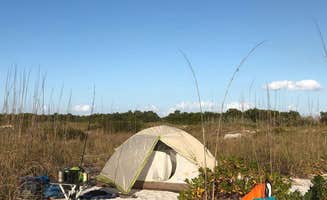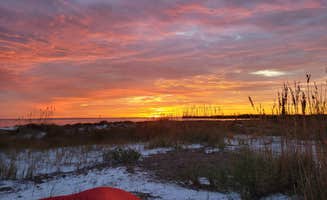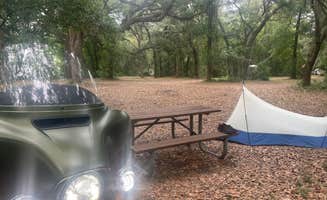Primitive camping near Belleair Bluffs, Florida requires careful planning due to limited freshwater access and changing seasonal conditions. The majority of camping options lie along the Gulf Coast, with most sites requiring boat transportation across saltwater passages. During winter months (November-February), temperatures range from 55-75°F with significantly reduced mosquito activity compared to summer months.
What to do
Wildlife photography opportunities: Upper Hillsborough Water Management Area offers diverse inland ecosystems for wildlife photographers. "Large open area with great shade trees, no water, privy. Easy pull through for RV. Tent spots. Fire rings," notes Scott O. at Upper Hillsborough Water Management Area.
Nighttime stargazing: The island locations provide minimal light pollution for astronomy enthusiasts. "Enjoy a night of primitive camping under the stars without a sound except insects and lapping waves on the beach," explains a camper at Anclote Key Preserve State Park.
Shoreline fishing: Many campers bring lightweight fishing gear to catch from the shore. "Spend your day swimming and sunbathing at the beach or kayaking around the island. If you arrived by motor boat try a bit of flats fishing but stay in designated areas," advises Jeanene A. at Anclote Key Preserve State Park.
What campers like
Solitude after day visitors leave: Many barrier islands transform from busy day-use areas to peaceful camping spots in late afternoon. "During the day there were quite a few boats on the island but by about 4pm we basically had the island to ourselves. Beautiful sunset and sunrises with crystal clear water," reports Kaitlin B.
Accessible primitive experiences: Despite requiring boat access, many locations offer relatively straightforward transportation options. "Park off the Pinellas Byway before you get to the DeSoto bridge, paddle between Summer Resort Key and Sister Key and you're there. One of the easiest island paddles out there - just a little over a mile," explains Dan X. at Shell Key Preserve.
Dual water access: Campers appreciate having both Gulf and Intracoastal access from single sites. "On the west coast of the island is the blue waters of the Gulf of Mexico, while only footsteps away is the lush waters of the Intercoastal waterway," notes Steve S.
What you should know
Strict environmental regulations: These preservation areas have specific rules about human waste and fires. "There are no bathroom facilities and all human waste must be buried well and paper take in trash. EVERYTHING- and they mean everything you bring on the island must be taken off with you," cautions a camper about Anclote Key.
Tent placement challenges: Finding suitable flat ground can require searching. "You do need to be mindful that there are lots of plants, shrubs, sticks and stones which can make being in a tent pretty rough if you don't have a good pad and a tarp to protect your tent," advises Elliott B.
Weather impacts access: Camping permits can be revoked during poor conditions. "Depending on the weather and the tides/current, they may shut down camping, or you may want to go by boat (not paddle/kayak)," warns Alyssa D. at Anclote Key Preserve State Park.
Tips for camping with families
Food storage strategies: Prepare for wildlife encounters by securing provisions. "Make sure all food is secured (we anchored our boat with provisions on board a bit off shore and swam in to no risk raccoons getting into gear as it was a calm night with clear weather)," recommends Jeanene A.
Winter camping advantages: Cooler months offer more comfortable conditions. "No skeeters in October," notes Dan X., highlighting a significant advantage for family comfort during fall camping at Anclote Key Preserve State Park.
Water safety planning: Many sites require crossing open water with children and gear. "We kayaked out from Anclote river park and stayed two nights on the island. There are no amenities so we packed everything we would need in the kayak," shares Kaitlin B.
Tips from RVers
Limited options but viable alternatives: While barrier islands don't accommodate RVs, inland options exist. "We were the only ones there for the weekend, probably because of the summer heat. However, it was nice and free. There is a porta-potty, but I didn't check it out," explains a camper at Upper Hillsborough Water Management Area.
Trash management: Unlike developed campgrounds, dispersed sites require complete waste management. "The lack of trash cans was surprising. Just take your trash with you, leave no trace, and it was an enjoyable and free experience!" advises SukiDookie about Upper Hillsborough.
Simple meal planning: With limited facilities, RVers must plan efficiently. "Golden Coral buffet in town," mentions Scott O., suggesting combining self-sufficient camping with occasional restaurant meals to reduce cooking needs.




